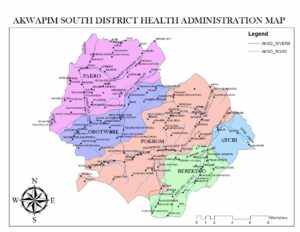Akwapim South Municapal Profile
The Akwapim South District is one of the thirty-three administrative districts in the Eastern Region of Ghana. Until its creation in November, 2012, the now Akwapim South Municipal was part of the former Akwapim South District with it’s capital as Nsawam. The Akwapim South Municipal (ASM) was established base on the legislative instrument (LI 1839), with Aburi as the capital. The District is situated in the south-eastern part of the Eastern Region, covering an estimated area of about 278.42 kilometers square. The office of the Health Directorate is situated, temporarily, at the ICT centre in Aburi.

Physical Features
ASM experience virtually evenly spread rainfall pattern throughout the year but attains its peak from May to November. The Municipal currently houses Agri-Impact, an international farming company in the Municipal. The mean annual rainfall is about 1130mm with a bimodal distribution and a maximum daily amount of about 67mm. The period May-June constitutes the major wet season, with the minor wet season occurring between September and November. Annual temperature is about 24C with average maximum and minimum being 36C and 18C respectively. The vegetation of the municipal is of forest zones and is notably for its rich forest which serve as a tourist site.
Political And Administration Structure
The political administrative structure is made of municipal administration and local government structures. The municipal administration is facilitated by the municipal assembly and coordinated by the departmental structures. The local government provide the cultural support systems for the smooth running of the administrative structures
Traditional Administration
Traditional Administration in ASM is highly centered on chieftaincy as practiced by its constituent ethnic groups. The Municipal has Traditional Councils headed by a Paramount Chief with sub divisional chiefs, clans and family heads, as well as village chiefs assisting and maintaining law and order at the traditional levels. The habitats of the Municipal are highly indigenous.
Economy And Living Conditions
Farming constitutes the main economic activity of the majority of the people, with maize, cassava, and plantain being the major crops. Pineapple is grown for export as well as exotic vegetables. These ventures (Pineapple) are undertaken by both individuals and private companies. Akwapim South boast of tourist attraction places like the Aburi Botanical Gardens, Papaya Botanical Gardens at Konkonuru. Another remarkable place that catches people’s attention and also gives fame to the Municipal is the Presidential Lodge at Peduase, Peduase Valley Resort and Ashesi University in Berekuso. The municipal is known for having very fine and luxurious hotels which gives comfort and relaxation to both Ghanaian and foreigners. Most people in the Municipal are farmers – commercial and peasant. Commercial crops produced include pawpaw, mango, pineapple, and other exportable crops whilst peasant farmers produce crops including cassava, maize, plantain, cocoyam. Majority of residents rely on both mechanized and non-mechanized bore holes. A small proportion of the people depend on pipe-borne water, ponds, wells and streams for domestic use. Toilet facilities in urban communities are mainly KVIPs and in rural communities, they are pit latrines. A few smaller communities resort to indiscriminate defecation. Refuse disposal is done on proper disposal sites in most communities with a small proportion practicing crude dumping.
Health Service
The municipal has a total of thirty (30) health facilities in five sub-municipals. The breakdown of the health facilities are as follows:
| Health Facility | Quantity (Number) |
|---|---|
| Health Centers (Public) | 5 |
| Hospital (KOM Presbyterian Hospital) Not Operational | 1 |
| Clinic (CHAG, Kom Clinic) | 1 |
| CHPS: | 24 |
|
24 |
|
7 |
|
11 |
|
6 |
Health Facilities By Ownership
The vegetation cover is generally evergreen made up of thick forest virgin. The land is low lying with few mountains. It has Wawa, Mahogany and Odum as some of the tree species. There are two (2) forest reserves in the district namely Tinse Forest Reserve at Pokukrom and Desiri Forest Reserve at Sabronum.
| TYPE OF FACILITY | Number | OWNERSHIP |
|---|---|---|
| Hospital | 1 | CHAG, Non Operational |
| Public Health centers | 5 | Ghana Health Service |
| Mission clinic | 1 | CHAG |
| Private clinics | 1 | Sibakon Medical Center |
| CHPS | 24 functional | Ghana health Service |
Demography
The municipal operates within a five sub municipal with about 163 communities. The current population is projected at 77, 137 for the year under review (based on 2021 population census). Out of this, 50.7% are females with 49.3%, males.



